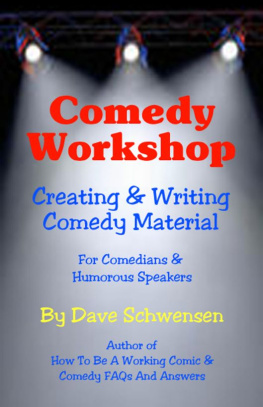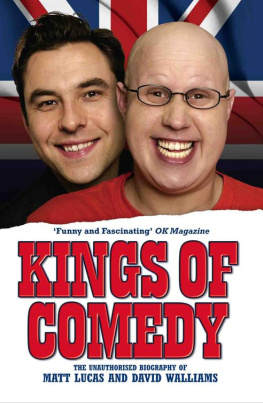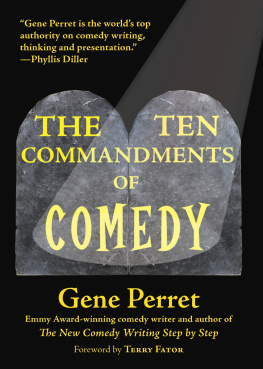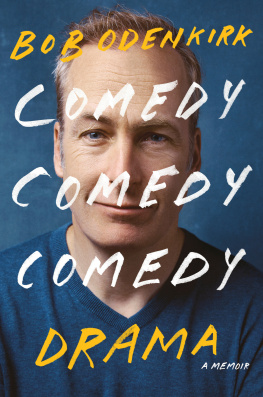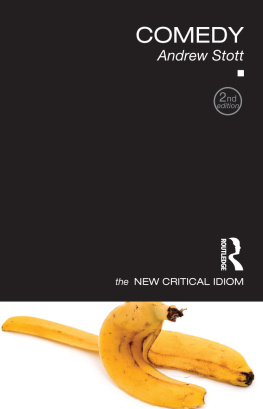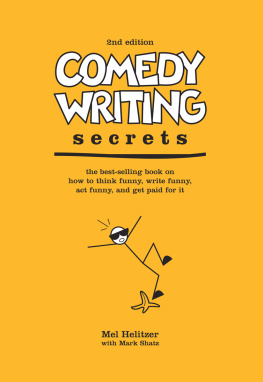Comedy and Distinction
Comedy is currently enjoying unprecedented growth within the British culture industries. Defying the recent economic downturn, it has exploded into a booming billion-pound industry both on TV and on the live circuit. Despite this, academia has either ignored comedy or focused solely on analysing comedians or comic texts. This scholarship tends to assume that through analysing an artists intentions or techniques, we can somehow understand what is and what isnt funny. But this poses a fundamental question funny to whom? How can we definitively discern how audiences react to comedy?
Comedy and Distinction shifts the focus to provide the first ever empirical examination of British comedy taste. Drawing on a large-scale survey and in-depth interviews carried out at the Edinburgh Festival Fringe, the book explores what types of comedy people like (and dislike), what their preferences reveal about their sense of humour, how comedy taste lubricates everyday interaction, and how issues of social class, gender, ethnicity and geographical location interact with patterns of comic taste. Friedman asks:
Are some types of comedy valued higher than others in British society?
Does more legitimate comedy taste act as a tangible resource in social life a form of cultural capital?
What role does humour play in policing class boundaries in contemporary Britain?
This book will be of interest to students and scholars of sociology, social class, social theory, cultural studies and comedy studies.
Sam Friedman, from September 2014, is Assistant Professor in Sociology at the London School of Economics and Political Science (LSE). He has published widely on comedy, social mobility and social class. He is also the publisher of Fest magazine, the largest magazine covering the Edinburgh Festival Fringe.
Culture, Economy and the Social
A new series from CRESC the ESRC Centre for Research on Socio-cultural Change
Editors
Professor Tony Bennett, Social and Cultural Theory, University of Western Sydney; Professor Penny Harvey, Anthropology, Manchester University; Professor Kevin Hetherington, Geography, Open University
Editorial Advisory Board
Andrew Barry, University of Oxford; Michel Callon, Ecole des Mines de Paris; Dipesh Chakrabarty, The University of Chicago; Mike Crang, University of Durham; Tim Dant, Lancaster University; Jean-Louis Fabiani, Ecoles de Hautes Etudes en Sciences Sociales; Antoine Hennion, Paris Institute of Technology; Eric Hirsch, Brunel University; John Law, The Open University; Randy Martin, New York University; Timothy Mitchell, New York University; Rolland Munro, Keele University; Andrew Pickering, University of Exeter; Mary Poovey, New York University; Hugh Willmott, University of Cardiff; Sharon Zukin, Brooklyn College City University New York/Graduate School, City University of New York
The Culture, Economy and the Social series is committed to innovative contemporary, comparative and historical work on the relations between social, cultural and economic change. It publishes empirically based research that is theoretically informed, that critically examines the ways in which social, cultural and economic change is framed and made visible, and that is attentive to perspectives that tend to be ignored or side-lined by grand theorising or epochal accounts of social change. The series addresses the diverse manifestations of contemporary capitalism, and considers the various ways in which the social, the cultural and the economic are apprehended as tangible sites of value and practice. It is explicitly comparative, publishing books that work across disciplinary perspectives, cross-culturally, or across different historical periods.
The series is actively engaged in the analysis of the different theoretical traditions that have contributed to the development of the cultural turn with a view to clarifying where these approaches converge and where they diverge on a particular issue. It is equally concerned to explore the new critical agendas emerging from current critiques of the cultural turn: those associated with the descriptive turn for example. Our commitment to interdisciplinarity thus aims at enriching theoretical and methodological discussion, building awareness of the common ground that has emerged in the past decade, and thinking through what is at stake in those approaches that resist integration to a common analytical model.
Series titles include:
The Media and Social Theory (2008)
Edited by David Hesmondhalgh and Jason Toynbee
Culture, Class, Distinction (2009)
Tony Bennett, Mike Savage, Elizabeth Bortolaia Silva, Alan Warde, Modesto Gayo-Cal and David Wright
Material Powers (2010)
Edited by Tony Bennett and Patrick Joyce
The Social after Gabriel Tarde: Debates and Assessments (2010)
Edited by Matei Candea
Cultural Analysis and Bourdieus Legacy (2010)
Edited by Elizabeth Silva and Alan Ward
Milk, Modernity and the Making of the Human (2010)
Richie Nimmo
Creative Labour: Media Work in Three Cultural Industries (2010)
Edited by David Hesmondhalgh and Sarah Baker
Migrating Music (2011)
Edited by Jason Toynbee and Byron Dueck
Sport and the Transformation of Modern Europe: States, Media and Markets 19502010 (2011)
Edited by Alan Tomlinson, Christopher Young and Richard Holt
Inventive Methods: The Happening of the Social (2012)
Edited by Celia Lury and Nina Wakeford
Understanding Sport: A Socio-Cultural Analysis (2012)
John Horne, Alan Tomlinson, Garry Whannel and Kath Woodward
Shanghai Expo: An International Forum on the Future of Cities (2012)
Edited by Tim Winter
Diasporas and Diplomacy: Cosmopolitan Contact Zones at the BBC World Service (19322012)
Edited by Marie Gillespie and Alban Webb
Making Culture, Changing Society
Tony Bennett
Interdisciplinarity: Reconfigurations of the Social and Natural Sciences
Edited by Andrew Barry and Georgina Born
Objects and Materials: A Routledge Companion
Edited by Penny Harvey, Eleanor Conlin Casella, Gillian Evans, Hannah Knox, Christine McLean, Elizabeth B. Silva, Nicholas Thoburn and Kath Woodward
Accumulation: The Material Politics of Plastic
Edited by Gay Hawkins, Jennifer Gabrys and Mike Michael
Theorizing Cultural Work: Labour, Continuity and Change in the Cultural and Creative Industries
Edited by Mark Banks, Rosalind Gill and Stephanie Taylor
Comedy and Distinction: The Cultural Currency of a Good Sense of Humour
Sam Friedman
Rio de Janeiro: Urban Life through the Eyes of the City (forthcoming)
Beatriz Jaguaribe
Devising Consumption: Cultural Economies of Insurance, Credit and Spending (forthcoming) Liz Mcfall
Unbecoming Things: Mutable Objects and the Politics of Waste (forthcoming)
Nicky Gregson and Mike Crang


